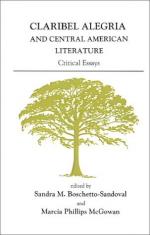|
This section contains 5,387 words (approx. 18 pages at 300 words per page) |

|
SOURCE: "Claribel Alegría and the Elegiac Tradition," in Claribel Alegría and Central American Literature: Critical Essays, edited by Sandra M. Boschetto-Sandoval and Marcia Phillips McGowan, Ohio University Center for International Studies, 1994, pp. 183-99.
In the following essay, Engelbert asserts that Alegría utilizes the conventions of Hispanic funereal poetry to lament the death and suffering in El Salvador.
In his book on Jorge Manrique, Pedro, Salinas defines the poet's relation to literary tradition through an extended analogy. Literary tradition, he says, is comparable to "what in natural history is called habitat, the zone capable of sustaining life." The poet, he observes, is born to a particular tradition and lives and breathes and creates within its boundaries; the savage acquires the elements of his song by listening to the shaman; the modern poet does do by poring over Horace and Baudelaire. Poetic creation only occurs within the...
|
This section contains 5,387 words (approx. 18 pages at 300 words per page) |

|


